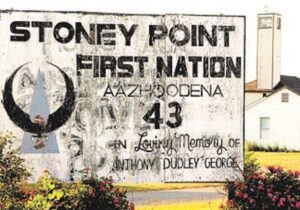Land returned to Kettle and Stony Point
The most recent special issue of Anishinabek News ((Vol. 30, issue 3) commemorated the 25th anniversary of the Ipperwash Crisis and the shooting of Anthony “Dudley” George. And almost a quarter century to the date of George’s death, Ipperwash Provincial Park was transferred back to its Indigenous owners, the people of Kettle and Stony Point, through a process known as Addition to Reserve (ATR), and as part of Canada’s obligation to uphold its treaty obligations to the Anishinaabeg.
A federal administerial order returning the land was signed on August 25 and the process was officially announced on September 8. Comments by various public officials were positive.
The Honourable Carolyn Bennett, Minister of Crown-Indigenous Relations, sees the return of the park as “another step in advancing reconciliation and improving the treaty relationship with First Nations.”
Greg Rickford, Minister of Energy, Northern Development and Mines and Minister of Indigenous Affairs, announced that “Ontario is proud to see the completion of this land transfer to the Chippewas of Kettle and Stony Point First Nation.” In preparation for the ATR, Rickford’s government transferred the lands to Canada on July 30, 2020.
When interviewed about the ATR Chippewas of Kettle and Stony Point Chief Jason Henry stated, “The return of the former Provincial Park lands is an important legal indicator for our Ancestors and our future generations that we’re home again and the land is legally ours.”
Chief Henry’s words harkened to former treaties, to negotiations and promises that stretched back to 1818, but Aazhoodena, the lands of Stoney Point, have been taken from the community, acre by acre and over time. First, in 1928, when a Sarnia land developer W. J. Scott bought four large shoreline lots, a total of 377 acres, following an October 12, 1928, surrender vote. He did not hold onto the land long, as the province, keen to establish a network of public parks, bought the westernmost parcel, or Lot 8, Concession A in 1936. Scott was paid $10,000 for the 113-acre parcel, which became known as Ipperwash Beach, Ontario’s fourth provincial park. Six years later, Canada, evoking the War Measures Act, took the rest of Aazhoodena.
Chief Henry, who has been involved in the negotiations since elected in 2018, continues the work of former Chief Tom Bressette. He retains some optimism for the future.
“The return of this portion of the lands is but a small portion of what was lost and although the process is not perfect,” he told the press. “It gives hope that in the future we may see the full return of Aazhoodena.”


